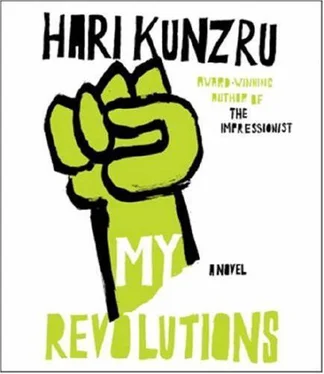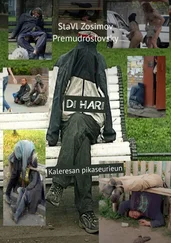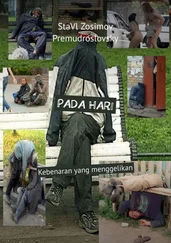There was an anarchist bookshop in Whitechapel where we’d sometimes go to listen to foreign speakers, anti-Franco Spaniards, Greeks on the run from the Colonels. Half of Europe was still Fascist and secretly our own government was collaborating with them, sharing information with their police forces. I heard about things that weren’t reported in the papers — bombs in airline offices, assassination attempts against European leftists. In the East End we had our own Nazi problem. I can’t remember if we were already
calling them skinheads. They were crop-haired mods out of Hoxton or Bethnal Green, kids who beat up immigrants, put lighted rags through their letterboxes. The police didn’t do much because many of them were sympathetic to the attackers. I’d started to do odd jobs to make money, casual work on building sites. I’d hear the same thing everywhere, how the Pakis were moving in, breeding like flies. Historically they’d always stayed farther south, near the Thames in an area the Spitalfields boys called Brown Town, but now the council was redeveloping it and suddenly little knots of dark-skinned men were standing on street corners they had no business to stand on, corners that had always belonged to white people.
Though much of the violence was random, some of it was organized. There was a pub in Cheshire Street, which over the years had become a kind of Fascist shrine, a place where Nazi splinter groups went to form new parties or sniff Eva Braun’s knickers or whatever it was they got up to when they weren’t marching around saluting the Union Jack. I heard about it from Leo Ring, the leader of a group who were living in one of the semiderelict squares in Stepney. Leo, at twenty-four, was tall and dark, with a head of curly black hair and a past as a member of the Firm, a gang of Barking mods who’d once terrorized every blues and R&B club in London. Leo’s friends had gotten into acid, then the revolution. They talked about “street politics,” about “keeping it low to the ground.” The idea that a cabal of Mosleyites could hold meetings in the saloon bar of their local was an affront and they wanted to do something about it.
At Workshop Thirteen I reported Leo’s plan to the others. Should we get involved? Some of us were very much against it. A suggestion was made (by Sean, I think) to exclude the women, but was rejected as chauvinist. We were in or out as a group. I said we should be in. Anna agreed. Sean asked me whether I had the stomach for it. Secretly, I wasn’t sure, but of course I said yes. The logic of confrontation started to do its work. I cycled over to Leo’s to give him the news.
It’s a strange thing to walk out of your front door on your way to a fight. There’s something disconnected about it, something about the collision of routine with its opposite that renders the world temporarily unreal. For some people, violence is easy, even familiar. For a few, it’s actively pleasurable. For most of us at Thirteen it meant overcoming almost insurmountable barriers, mental and physical. We were afraid. Everything about our backgrounds, our conditioning, the ideals we professed in our politics screamed at us not to go through with it. As we prepared to meet Leo, I watched Helen throw up into the toilet. Matthias was holding her head. “I don’t think I can,” she was saying. “I just don’t think I can.” Helen was tiny, barely five feet tall. Until we’d brow-beaten her into abandoning her position, she’d always considered herself a pacifist. She’d been pushed around in marches, but that was all. She was a sociology graduate, a doctor’s daughter.
Me, I had the metallic taste in my mouth that always came before I did anything dangerous. I wasn’t like Helen. Neither was Sean. He and I were buzzing on the drama we’d created for ourselves, eager to be off. I could see something in Anna’s eyes too. Not avidity, exactly. Clarity. She spoke to Helen with exaggerated gentleness. “What are you afraid of?” she asked. “It doesn’t matter, honey. Getting hurt doesn’t matter. Nothing that happens to any one of us matters, because what we’re doing is right.” I watched her, gaunt and tender, a crash helmet on the floor beside her, like a figure from a medieval altarpiece.
We had spanners, pipes, bats. We wore bandannas and hard hats. We met up in a park near the pub. There were perhaps fifty of us: Leo’s people, others who’d come from south or west London. There wasn’t much talking. Just before closing time, one of Leo’s friends stuck his head round the door to confirm that the pub was full and some kind of meeting was going on upstairs.
We started jogging down the narrow cobbled street toward the pub. Someone blew a whistle. Leo had a sailor’s distress flare, which he lit and threw through the front door. We aimed bricks and dug-up cobbles at the windows. Soon orange smoke was billowing out
of the pub and choking men were staggering out to be met by a rain of blows. Most were thoroughly disoriented. One or two fought back. I swung the plank I was carrying, felt it connect once, twice. It was a hit-and-run action, all over in five minutes. Beside me, Anna was battering someone with an iron bar. We attacked anyone who came out. Bodies staggering, crawling, lying still on the ground. As arranged, when the whistle was blown a second time we ran off into the side streets, helping anyone who couldn’t walk unaided.
One of Leo’s friends had been stabbed. I drove him to the hospital, along with another boy who had a broken arm. No one from Thirteen was seriously hurt. That night we held a party; in an atmosphere of borderline hysteria, most of us drank ourselves senseless while a few, like Helen, sat around in a state of mute shock.
Two days later a car stopped beside Jay and Matthias as they walked up Bethnal Green Road. Four men got out and beat them so badly that both had to go to the hospital. I spent the evening driving around in Sean’s van, looking for the people who had done it. The next night, someone fire-bombed a Sylheti-owned shop on Brick Lane. We responded in kind, by burning out three black cabs at a railway-arch garage owned by Gordon Webster, self-appointed “commissioner” of the British Patriots League. By the beginning of July a small unreported war had started in the East End, one that was still going on ten, even fifteen years later, long after we’d all gone.
Leo and several of his friends started living at Thirteen. We now had a reputation in the underground, a notoriety that was making us nervous. People we didn’t know were starting to turn up, expecting to stay. There were always too many strangers in the building, people we didn’t recognize, who didn’t quite fit. One night in a pub, a long-haired man approached me and Sean and told us he’d heard we wanted to buy a gun. We said we didn’t know what he was talking about and walked home, looking behind us all the way to see if we were being followed. We were sure Thirteen was
either going to get busted or attacked by the Nazis. We decided to shut it down, at least temporarily, and join an occupation that was in progress a few miles away in Leyton.
Sylvan Close was an ironically named spot, a melancholy cul-de-sac of boarded-up terraced houses on the site of a proposed new road. When I first went there we broke a hole and climbed through it to take a look around. Two rows of five and a couple more at the end, windows and doorways blocked by sheets of corrugated iron. The occupation was centered around Alex Hill, a tall, rake-thin man with thick corrective glasses and a lugubrious manner that concealed a sly sense of humor. He was of indeterminate age and always wore the same rather grubby black trench coat, which made him look like an out-of-work film noir detective. His plan for the derelict houses was nothing if not ambitious. It involved secretly renovating the whole street, replacing rotten floorboards and missing windows, reconnecting plumbing and electricity, then moving in a whole population of homeless people from various local hostels. Eventually he assembled a committee, including Pat and Gavin Ellis, who arranged things with military precision. Building materials were stored in someone’s garden. Everything from printing to fund-raising was deputized to separate work groups. Somehow the secret was kept. The job got done.
Читать дальше












